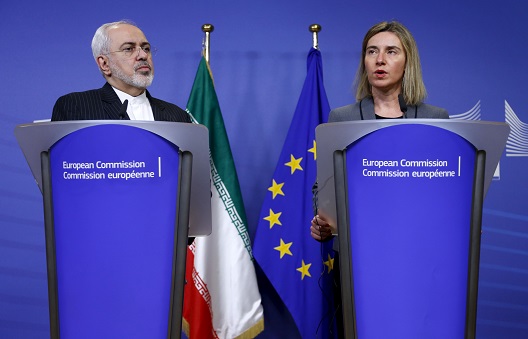US President Donald Trump waived economic sanctions on Iran’s banks and oil exports on September 14, as part of a law passed by Congress in 2015, following the landmark Joint Comprehensive Plan of Action (JCPOA) agreement—or Iran nuclear deal. The law requires every 120 days for the US president to decide whether to waive the renewal of economic sanctions. The more significant deadline in October is whether Iran is in compliance with the deal and which Trump seems intent on ending the agreement. The ever-mounting aggressive rhetoric and actions of the current US administration towards Iran signal a potential shift in the Obama legacy of the Iran deal. The US could further disrupt the balance in the region if it ends the Iran deal, yet in stark contrast, European allies continue to advocate for a pragmatic solution to save it.
France continues to be a key player among the dissident voices against the Trump administration on the Iran deal, as part of the general trend observed by most European Union (EU) member states. The French Foreign Minister, also the former French Defense Minister, Jean-Yves Le Drian, stated earlier on September 6 that the US stance on the Iran nuclear issue ‘could endanger’ the accord itself—reaffirming that the deal established a precedent on multilateral diplomacy for global nuclear non-proliferation. Le Drian also said the French President Emmanuel Macron expressed to Trump his willingness to return to negotiations after provisions expire in 2025; a sticking point for other nations that chose to reject the deal such as Israel and other opponents.
EU Foreign Policy chief, Federica Mogherini, is scheduled to host a meeting between US Secretary of State, Rex Tillerson with the Iranian Foreign Minister Javad Zarif on Wednesday September 20 for nuclear talks. This meeting received overwhelming support from Great Britain, Germany, and France. UN Secretary General Antonio Guterres on Monday also reinforced maintaining the deal and that ‘this historic agreement is the best way to ensure the exclusively peaceful nature of Iran’s nuclear programme’ as further support from European allies.
The European Union has rarely adopted a unified voice on foreign affairs, especially the Middle East, due to its inability to mobilize all member states in issues related to external affairs. Yet, it appears there is unification on Iran. In a recent signed statement, seventy-six high-level Europeans verify Iran’s compliance in the nuclear deal as one of the world’s most robust. Europe, they argue, is more invested in Iran not achieving nuclear capability and strictly adhering to the agreement and any ‘unilateral US action that would jeopardize the JPCOA would be a grave mistake.’
The EU is adopting a proactive stance on the Iranian nuclear dossier as a result of member states unwillingness to allow tensions to escalate in the region. The transnational refugee crisis from the Middle East and North Africa region has undermined the EU’s aptitude in responding effectively to a large scale crisis. The prospect of further cutting ties with the Middle East due to re-examining the JCPOA could open the doors for more regional instability with a destructive spillover effect.
A UN nuclear watchdog has asserted, on August 31, Iran is within its limits and in compliance with the nuclear accord. However, the policies of US President Donald Trump do not rely on reports of international institutions, as he shown by publicly criticizing NATO and the UN. Further, fact-finding reports developed as a result of UN inspections, also do not substantiate the negative attitude of the Trump administration towards the Iran nuclear deal.
Trump is determined in scrapping what he judges a ‘terrible deal,’ without any ground of evidence of violations from Iran. The EU, on the other hand, seems to dissociate the political level from the practical one when it comes to the JCPOA. It is relying on the idea that the nuclear accord solely prevents Iran from acquiring a nuclear weapon without utilizing the accord for what it increasingly looks like—a witch hunt—that could harken back to 2003 when the Bush administrations insisted on the existence weapons of mass destruction in Iraq where there were known.
The Iran nuclear deal remains on thin ice. The 72nd session of the UN General Assembly ongoing this week in New York, will be an opportunity for Donald Trump, who is speaking for the first time as the US president before the General Assembly, to further garner anti-Iran deal backers. Leading Israeli political figures have already called for Prime Minister Netanyahu to push Trump to ‘amend or annul’ the accord. And the task will not be difficult—at least in the Middle East. Saudi Arabia Crown Prince bin Salman has reportedly made a covert visit to Israel recently, signaling that the anti-Iran regional clan is now more than ever ready to act whenever the US gives its token of approval.
The Iran nuclear deal is at risk from the US and it remains unlikely that the EU alone could succeed in reversing Trump’s direction. The EU remains aware of the shifting reality of the region and in realizing the inherent dangers of reversing an Iranian nuclear agreement for the security of Europe and its allies. Time will tell if the EU can shift Trump’s perceptions and offer a ‘win’ to the US administration in other forms.
Mariam El Atouabi is a Youth Delegate at the United Nations and chairwoman of ‘Josoor‘ an NGO in the MENA region advocating for dialogue and cooperation in the Middle East through youth empowerment. She tweets @MariamElat.
Image: Photo: Iran's Foreign Minister Mohammad Javad Zarif and European Union foreign policy chief Federica Mogherini (R) address a joint news conference at the EU Commission headquarters in Brussels, Belgium, February 15, 2016. REUTERS/Francois Lenoir
